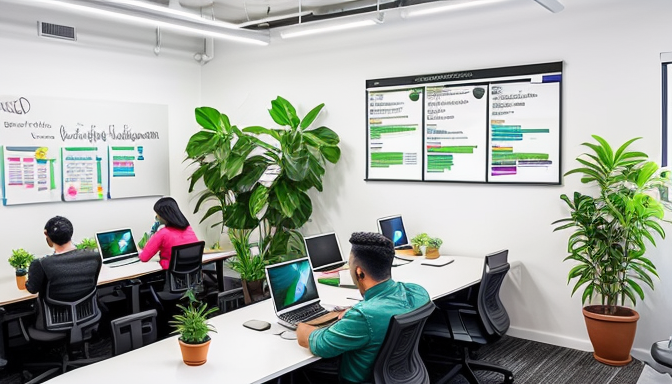In today’s fast-paced world, startups are like ships navigating through ever-changing waters. To truly thrive, they need more than just a great idea; they require a mindset that embraces adaptability, resilience, and innovation. Think of it this way: the startup journey is akin to a rollercoaster ride, filled with exhilarating highs and challenging lows. The key to enjoying the ride is to stay flexible and be ready to pivot when necessary.
Startups often face unpredictable challenges and fierce competition. This is where the ability to adapt becomes crucial. By cultivating a flexible mindset, entrepreneurs can respond to market demands and trends swiftly. They can navigate obstacles with ease, turning potential setbacks into opportunities for growth. For instance, when a product doesn’t resonate with customers, instead of giving up, a startup should analyze feedback and make the necessary adjustments. This agility can be the difference between success and failure.
Moreover, fostering a culture of innovation within the team is essential. An environment that encourages creative thinking, experimentation, and collaboration can lead to groundbreaking ideas and solutions. It’s not just about having a brilliant product; it’s about continuously improving and evolving. By promoting open communication and brainstorming sessions, startups can harness the collective intelligence of their team, driving continuous improvement and growth.
In conclusion, mastering the startup mindset means being prepared for anything. Embrace change, foster innovation, and you’ll not only survive but thrive in the competitive landscape of entrepreneurship.
Embracing Change and Adaptability
In the fast-paced world of startups, embracing change isn’t just a nice-to-have; it’s a necessity for survival. Think about it: every day, new technologies emerge, consumer preferences shift, and market dynamics evolve. If you’re not ready to pivot, you might find yourself left in the dust. So, how can entrepreneurs cultivate this essential flexibility? Well, it starts with a mindset that views change as an opportunity rather than a threat.
One effective strategy is to foster a culture of open communication within your team. When everyone feels comfortable sharing their ideas and concerns, it creates a dynamic environment where adaptability thrives. Encourage your team to ask questions like, “What if we tried this?” or “How can we improve our approach?” This kind of dialogue not only sparks innovation but also prepares everyone to adjust to new challenges.
Moreover, regularly revisiting your business model is crucial. Consider using the Business Model Canvas to visualize and iterate on your strategies. This tool helps you identify key areas that may need adjustment. For instance, if customer feedback indicates a need for a different product feature, being open to modifying your offering can set you apart from competitors who cling to outdated ideas.
Ultimately, embracing change means being proactive. Stay informed about startup news, engage with founder interviews, and apply growth hacks that resonate with your vision. Remember, the most successful entrepreneurs are those who not only anticipate change but also thrive on it.

Fostering a Culture of Innovation
In the fast-paced world of startups, innovation isn’t just a buzzword; it’s the very essence of survival and success. To truly thrive, startups must cultivate a culture that not only welcomes creativity but actively encourages it. Think of your startup as a vibrant garden, where every idea is a seed waiting to blossom. How do you ensure that those seeds take root? By creating an environment where experimentation is celebrated, and failure is merely a stepping stone to success.
One powerful strategy is to establish open communication channels within your team. When team members feel comfortable sharing their ideas—no matter how wild—they are more likely to contribute to innovative solutions. Encourage brainstorming sessions where every voice is heard, and consider implementing regular feedback loops. This not only fosters collaboration but also cultivates a sense of ownership among your team.
Moreover, it’s essential to provide resources and time for innovation. Allow your team to dedicate a portion of their work hours to explore new concepts or projects. Google famously adopted this approach with their 20% time policy, resulting in groundbreaking products like Gmail and Google News. By giving your team the freedom to innovate, you’re not just investing in their growth—you’re investing in the future of your startup.
Lastly, remember that a culture of innovation is built on trust and respect. Celebrate both successes and failures as learning experiences. This way, your team will feel empowered to take risks, and you’ll find that the most unexpected ideas often lead to the biggest breakthroughs. So, let’s nurture that garden of creativity and watch it flourish!
Frequently Asked Questions
- What is the startup mindset?
The startup mindset is a unique approach that emphasizes adaptability, resilience, and innovative thinking. It’s about being open to change and ready to pivot when necessary, ensuring that you can navigate the ups and downs of the entrepreneurial journey.
- How can I cultivate adaptability in my startup?
Cultivating adaptability involves fostering a culture where change is embraced rather than feared. Encourage your team to experiment, learn from failures, and remain flexible in their roles. Regular brainstorming sessions can also help in identifying new opportunities and solutions.
- Why is innovation crucial for startups?
Innovation is the lifeblood of startups because it drives growth and keeps your business relevant in a competitive market. By creating an environment that encourages creative thinking and collaboration, you’re more likely to discover groundbreaking ideas that can set you apart.
- How do I foster a culture of innovation?
To foster a culture of innovation, provide your team with the freedom to explore new ideas without the fear of failure. Implement regular team workshops, allow for flexible working environments, and celebrate successes as well as learning experiences from failures.
